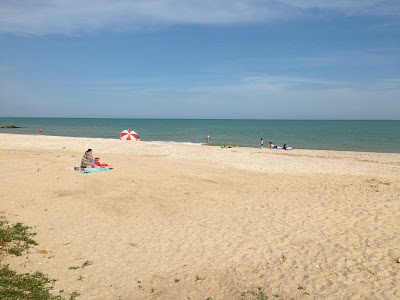Myths from Ukraine
Young people who are very good in the trades or in university invariably leave Ukraine for countries in the west. When we review the list of our graduating students to whom we gave financial assistance, we find that journalists, medical doctors, nurses, and teachers have chosen to remain in Ukraine. In fact one of our new doctors who is a recent graduate from our financial aid program, is coming to provide relief help at the Mennonite Centre clinic.
Ukraine isn't serious about cleaning up the environment. Ukraine has been forced to find ways of decreasing its dependence on expensive Russian gas, and its reliance on coal for the production of electricity. Just north of Tokmak, the city has a very large field of solar panels and the mayor informed us that they are going into a major recycling program. In addition, the current 65 windmills near the Sea of Asov will soon be expanded to 150.

Ukrainians don't volunteer for community service as much as other countries. This is definitely not true. Teachers spend a lot of their summer helping to paint, plaster, and get their schools ready for the fall.
In Molochansk, a local businessman organizes Saturday clean-up days where people collect garbage throughout the town. Both Tokmak and Molochansk are a lot cleaner than they used to be. Here are two pictures to show how clean the Willms estate now is.
We recently had a man who received medications after hip surgery volunteer to take people to the sea for summer holidays. During the recent conflicts in the south eastern area, many people collected food, medicines, and clothing for the soldiers. Many people volunteer to help their infirm neighbors with home care, gardening, and shopping. In fact this is a country where everyone knows their neighbors and looks out for them. They practice neighborhood watch.
Some Ukrainians believe that the roads are not really that bad. We believe that this not true; the many car tire repairs, and Lil's back, can vouch for that. Recently we took a trip to Orekhov, a village that in the 1870's had very few but very influential Mennonites. This year they are celebrating the tenure of the first village mayor, a Mr. Johann H. Janzen, who was mayor there for 25 years. At one point the road was so bad that people had made a parallel road with their vehicles on the grass for well over a kilometer. Now you had a so-called four-lane highway. The new section was dusty but smooth. It was a new form of a passing lane.
The myth that there is nothing modern about the current methods of agriculture. That may have been the case shortly after independence, but from the vantage point of the Colonista Hills on the west side of the Molotchna River, the fields look spectacular with canola, winter wheat, sunflowers, and barley. In 2016, Ukraine had very productive crops, and so far this year looks the same. The Melitopol cherry harvest has been abundant, and our fridge here gives evidence of the good fruit and the generous nature of the people. John Deere dealerships appear in many towns.
 |
| Fruit trees in Melitopol |
 Ukraine lost its tourist potential after it lost Crimea. While the loss of Crimea is significant, towns along the Sea of Asov are doing a booming business in building seaside resorts. New motels, parks, playground areas for children and restaurants, are springing up to accommodate those who can't get into Crimea for their summer holidays. The water is already warm enough to swim in, the beaches are gentle, and the sand is clean. For a family of four, you could have a good dinner without drinks for around $15 Canadian.
Ukraine lost its tourist potential after it lost Crimea. While the loss of Crimea is significant, towns along the Sea of Asov are doing a booming business in building seaside resorts. New motels, parks, playground areas for children and restaurants, are springing up to accommodate those who can't get into Crimea for their summer holidays. The water is already warm enough to swim in, the beaches are gentle, and the sand is clean. For a family of four, you could have a good dinner without drinks for around $15 Canadian.
The more we get to know this wonderful country and its people, the more we question our preconceived notions.
On Tuesday, June 13, we will be off to Vienna and finally into BC. Then day will become night, night will become day, and the meaningful time spent here will be well worth the adjustment.
To contribute to the work of the Mennonite Centre in
Ukraine, you can make your donation to “Friends of the Mennonite Centre”. All cheques should be mailed to George Dyck,
Treasurer, 3675 North Service Road, Beamsville, ON, L0R 1B1.
If you wish to donate online, go to the website www.canadahelps.org,
key in “Mennonite Centre Ukraine”, and click on the Search button. Then click on “V” for “View”, and “P” for
“Profile”. Then “Donate now”.
We thank you,
Ben and Lil Stobbe











